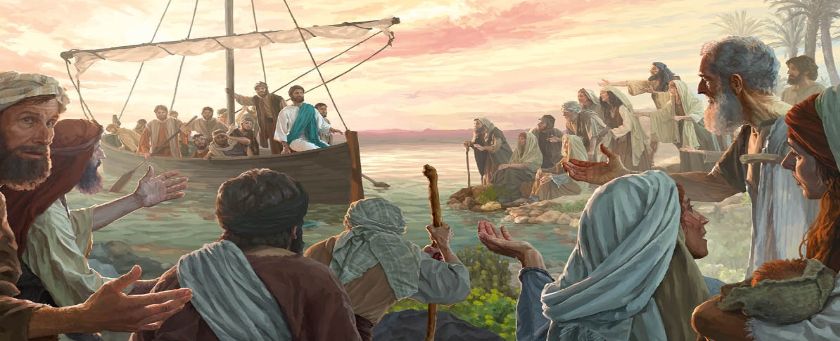Jesus Was Sent to The Lost Sheep of Israel
Eleventh Sunday of Ordinary Time, Year A

Readings:
Ex. 19:2-6a; Ps. 100; Rm. 5:6-11; Matt. 9:36-10:8
(Audio recorded live, 17 June 2023)
“Jesus’ heart was moved with pity for them because they were troubled and abandoned, like sheep without a shepherd.” This passage from today’s gospel shows the deep love Jesus has for his people. We hear of this same love in the Book of Exodus as God describes how he delivered the Israelites from their bondage in Egypt. He says, “I bore you up on eagle wings and brought you here to myself.” Then he enters into covenant with the people saying, “You shall be to me a kingdom of priests, a holy nation.” The notion of holiness is significant. To be holy means to be set apart for a special purpose. In the case of the covenant, God has chosen the Israelites out of all the peoples of the earth. He says, “you shall be my special possession, dearer to me than all other people.” Once again, we see the love God has for his people in choosing them to be so close to his heart. But, since we are talking about a covenant, it requires something of the people. God sets terms, saying, “if you hearken to my voice and keep my covenant,” then the people would become a kingdom of priests, a holy nation. Failure to keep the covenant, that is, listening to God’s voice and keeping the Commandments, would result in a fall from grace, and what was intended to be a kingdom of holy people would instead become a kingdom of wickedness.
Throughout the ages, the people of God have struggled to hearken to God’s voice and keep the commandments. When they began to trade with other nations, they were influenced by paganism and began to slip into idolatry. Rather than listen to God’s voice, they were taken up by astrologers, diviners, and soothsayers. They worshiped false gods and idols thinking that statues would answer their prayers. And whenever the people strayed from the One True God, they had to face the consequences of their actions. By succumbing to pagan practices, the Lord allowed them to be defeated by pagan kings. By succumbing to sin, the Lord allowed them to be consumed by vice. By failing to hearken to the Lord’s voice, the Lord allowed them to be deaf to the prophets, as Isaiah says, “Listen carefully, but do not understand! Look intently, but do not perceive! Make the heart of this people sluggish, dull their ears and close their eyes; Lest they see with their eyes, and hear with their ears, and their heart understand, and they turn and be healed” (Is. 6:9-10). It was no different for the pharaoh of Egypt when Moses was sent to convince him to let the Israelites go free. The Lord says, “Yet I will make Pharaoh so headstrong that, despite the many signs and wonders that I work in the land of Egypt, Pharaoh will not listen to you” (Ex. 7:3-4a). How quickly the Israelites forgot what the Lord had done for them, only to fall into the same hardness of heart as the Pharaoh who enslaved them. It would seem as though some things never change.
It was because the people were overrun by paganism, foreign occupation, sin, and guilt, that they were in such a dreadful state. But, this is also precisely why God sent his Only Begotten Son to bring the people back from the brink of despair. “Jesus’ heart was moved with pity for them because they were troubled and abandoned, like sheep without a shepherd.” The role of the shepherd to care for the flock, to protect them, to feed them, to train them to know their limits. But, the shepherds of Jesus’ day were more interested in making the people’s lives difficult, exploiting them, and laying heavy burdens on their shoulders. Jesus, came to lighten their load, to give them the true teaching of the Law, to show them the way, and to do so not as a military general, but as a brother.
St. Paul says, “Christ, while we were still helpless, yet died at the appointed time for the ungodly…But God proves his love for us in that while we were still sinners Christ died for us.” Jesus died for all people, even those who were least deserving, indeed even his enemies. This is how far-reaching the love of God is, and that love was handed on to the Apostles by way of the sacraments.
Just as Jesus named the Twelve and appointed them as his priests to, “Do this in memory of me,” so too have we all been named and appointed to lead a life of holiness according to his own example. It is through our baptism we have all become Christians, and it is up to us to hearken to the voice of the Lord and keep his covenant. Baptism is the first pledge, and our regular practice of the faith helps us to be a kingdom of priests, a holy nation. May the communion we share today strengthen us in holiness as we strive to keep the covenant in his blood.





Share this post
Twitter
Facebook
Pinterest
Email